最新广州新版五年级下册英语Unit9-12重点
- 格式:docx
- 大小:17.54 KB
- 文档页数:5
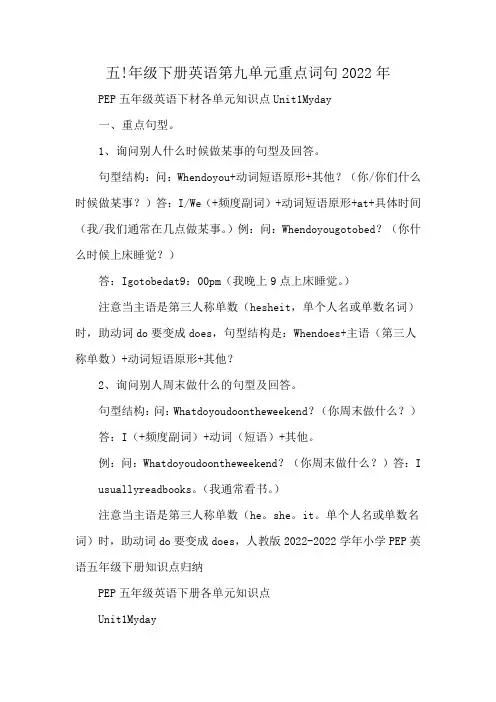
五!年级下册英语第九单元重点词句2022年PEP五年级英语下材各单元知识点Unit1Myday一、重点句型。
1、询问别人什么时候做某事的句型及回答。
句型结构:问:Whendoyou+动词短语原形+其他?(你/你们什么时候做某事?)答:I/We(+频度副词)+动词短语原形+at+具体时间(我/我们通常在几点做某事。
)例:问:Whendoyougotobed?(你什么时候上床睡觉?)答:Igotobedat9:00pm(我晚上9点上床睡觉。
)注意当主语是第三人称单数(hesheit,单个人名或单数名词)时,助动词do要变成does,句型结构是:Whendoes+主语(第三人称单数)+动词短语原形+其他?2、询问别人周末做什么的句型及回答。
句型结构:问:Whatdoyoudoontheweekend?(你周末做什么?)答:I(+频度副词)+动词(短语)+其他。
例:问:Whatdoyoudoontheweekend?(你周末做什么?)答:I usuallyreadbooks。
(我通常看书。
)注意当主语是第三人称单数(he。
she。
it。
单个人名或单数名词)时,助动词do要变成does,人教版2022-2022学年小学PEP英语五年级下册知识点归纳PEP五年级英语下册各单元知识点Unit1Myday一、重点句型。
1、询问别人什么时候做某事的句型及回答。
句型结构:问:Whendoyou+动词短语原形+其他?(你/你们什么时候做某事?)答:I/We(+频度副词)+动词短语原形+at+具体时间(我/我们通常在几点做某事。
)例:问:Whendoyougotobed?(你什么时候上床睡觉?)答:Igotobedat9:00p。
m(我晚上9点上床睡觉。
)注意当主语是第三人称单数(he,she,it,单个人名或单数名词)时,助动词do要变成does句型结构是Whendoes+主语(第三人称单数)+动词短语原形+其他?2、询问别人周末做什么的句型及回答。
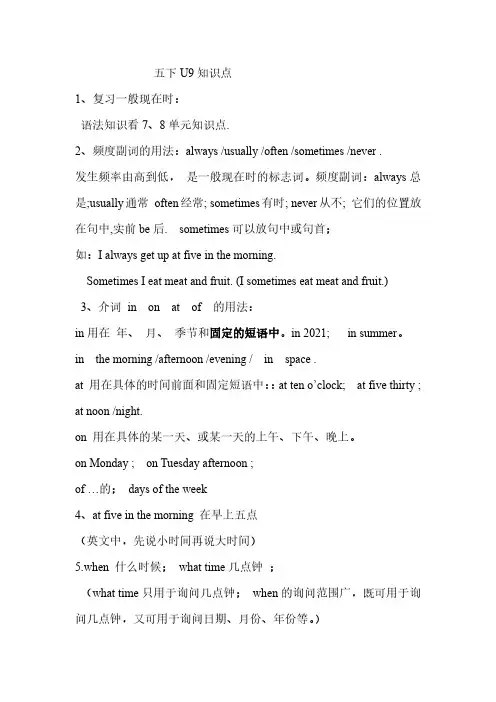
五下U9知识点1、复习一般现在时:语法知识看7、8单元知识点.2、频度副词的用法:always/usually/often/sometimes/never.发生频率由高到低,是一般现在时的标志词。
频度副词:always总是;usually通常often经常;sometimes有时;never从不;它们的位置放在句中,实前be后.sometimes可以放句中或句首;如:I always get up at five in the morning.Sometimes I eat meat and fruit.(I sometimes eat meat and fruit.)3、介词in on at of的用法:in用在年、月、季节和固定的短语中。
in2021;in summer。
in the morning/afternoon/evening/in space.at用在具体的时间前面和固定短语中::at ten o’clock;at five thirty; at noon/night.on用在具体的某一天、或某一天的上午、下午、晚上。
on Monday;on Tuesday afternoon;of…的;days of the week4、at five in the morning在早上五点(英文中,先说小时间再说大时间)5.when什么时候;what time几点钟;(what time只用于询问几点钟;when的询问范围广,既可用于询问几点钟,又可用于询问日期、月份、年份等。
)6.语音小结:字母组合or发[ɔ:],字母o在闭音节发[ɔ];需要掌握并运用的句型:1、When/What time/do you go to bed?I/We always go to bed at ten o’clock.When/What time does he have breakfast?He has breakfast at eight o’clock2、询问某人总是干什么吗?一般疑问句:Do you often go to school?Yes,I do/No,I don’t.Does he often go to school?Yes,he does./No.he doesn’t.否定句:I don’t go to school on Monday…Sunday.He doesn’t go to school on Monday…Sunday.肯定句:I always go to school on Monday…Sunday.He always goes to school on Monday…Sunday。
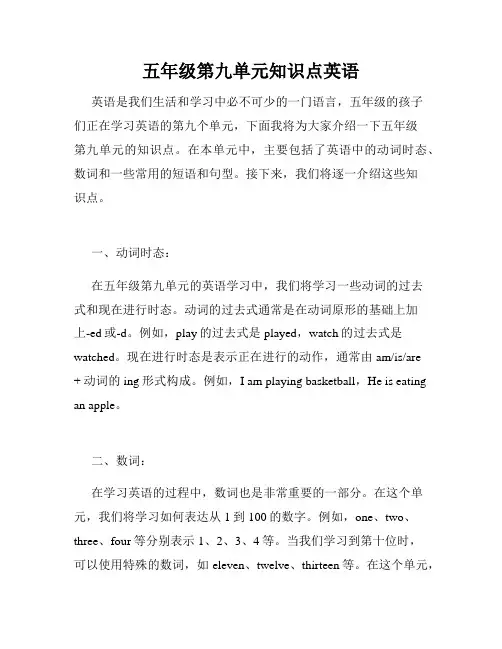
五年级第九单元知识点英语英语是我们生活和学习中必不可少的一门语言,五年级的孩子们正在学习英语的第九个单元,下面我将为大家介绍一下五年级第九单元的知识点。
在本单元中,主要包括了英语中的动词时态、数词和一些常用的短语和句型。
接下来,我们将逐一介绍这些知识点。
一、动词时态:在五年级第九单元的英语学习中,我们将学习一些动词的过去式和现在进行时态。
动词的过去式通常是在动词原形的基础上加上-ed或-d。
例如,play的过去式是played,watch的过去式是watched。
现在进行时态是表示正在进行的动作,通常由 am/is/are+ 动词的ing形式构成。
例如,I am playing basketball,He is eating an apple。
二、数词:在学习英语的过程中,数词也是非常重要的一部分。
在这个单元,我们将学习如何表达从1到100的数字。
例如,one、two、three、four等分别表示1、2、3、4等。
当我们学习到第十位时,可以使用特殊的数词,如eleven、twelve、thirteen等。
在这个单元,我们还将学习如何读和写21到99之间的数字,例如thirty、forty、fifty等。
三、常用短语和句型:在学习英语的过程中,短语和句型的应用非常重要。
在五年级第九单元中,我们将学习一些常用的短语和句型,以便更好地表达我们的意思。
例如,How many + 可数名词复数形式......? 这个句型用来询问物品的数量。
另一个常用句型是What are you doing?用来询问正在进行的动作。
通过学习这些短语和句型,我们可以更流利地进行英语交流。
四、其他知识点:除了以上介绍的动词时态、数词和常用短语和句型外,五年级第九单元的英语学习还包括了其他一些知识点。
比如,我们将学习一些常用的家庭成员的英文表达,如father、mother、brother、sister等。
此外,我们还将学习一些关于天气的表达,如sunny、rainy、cloudy等。
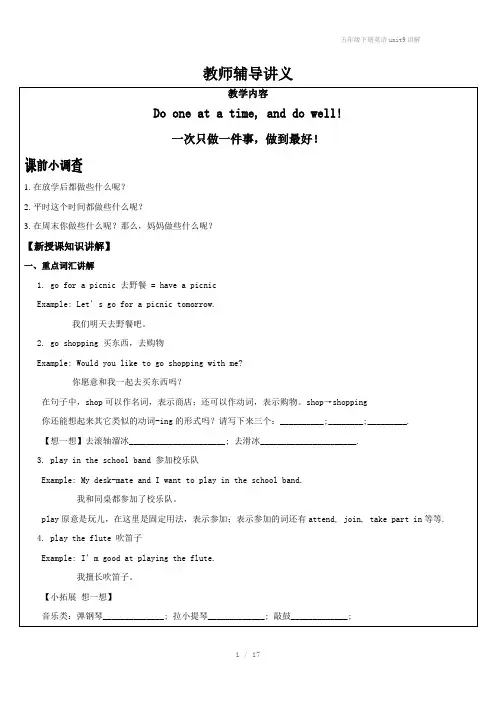
教师辅导讲义发现什么区别了吗?请记录下来:_________________________________________________________________________________________________.5. do the dishes 洗碗 = wash the dishesExample: I often do the dishes after supper.在家里,我还帮妈妈做这些家务:洗衣服_______________; 铺床_______________; 扫地_____________.6. make a model plane 制作航模Example: Can you make a model plane?你会制作航模吗?【想一想】做风筝______________; 做轮船模型___________;飞机还可以这样说_____________.7. learn to act 学表演Example: She is learning to act in the drama club.【课外拓展想一想】演员________; 女演员________; 导演 director; 编剧 scriptwriter.8.kick a shuttlecock 踢毽子Example: I like to kick a shuttlecock on gym class.【想一想】跳绳__________;9. go to the drama club 参加戏剧社club 俱乐部英语俱乐部____________.10.once 一次 twice 两次副词,表示频率【想一想】频率词:三次__________________; 十次_______________.基数词:1______; 2______; 3_______.序数词:第一___________; 第二___________; 第三___________.11.never 从未【想一想】通常__________; 经常_________; 总是__________; 有时__________.休息一下小谜语猜猜猜吧。
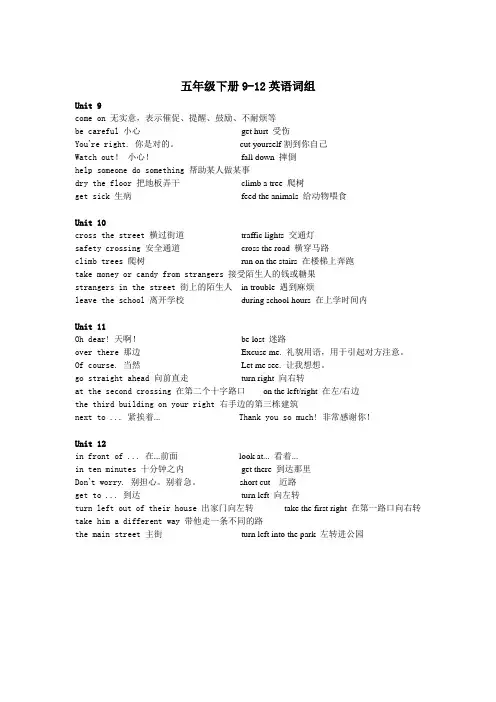
五年级下册9-12英语词组Unit 9come on 无实意,表示催促、提醒、鼓励、不耐烦等be careful 小心get hurt 受伤You’re right. 你是对的。
cut yourself割到你自己Watch out!小心!fall down 摔倒help someone do something 帮助某人做某事dry the floor 把地板弄干climb a tree 爬树get sick 生病feed the animals 给动物喂食Unit 10cross the street 横过街道traffic lights 交通灯safety crossing 安全通道cross the road 横穿马路climb trees 爬树run on the stairs 在楼梯上奔跑take money or candy from strangers 接受陌生人的钱或糖果strangers in the street 街上的陌生人in trouble 遇到麻烦leave the school 离开学校during school hours 在上学时间内Unit 11Oh dear! 天啊!be lost 迷路over there 那边Excuse me. 礼貌用语,用于引起对方注意。
Of course. 当然Let me see. 让我想想。
go straight ahead 向前直走turn right 向右转at the second crossing 在第二个十字路口on the left/right 在左/右边the third building on your right 右手边的第三栋建筑next to ... 紧挨着... Thank you so much! 非常感谢你!Unit 12in front of ... 在...前面look at... 看着...in ten minutes 十分钟之内get there 到达那里Don’t worry. 别担心。
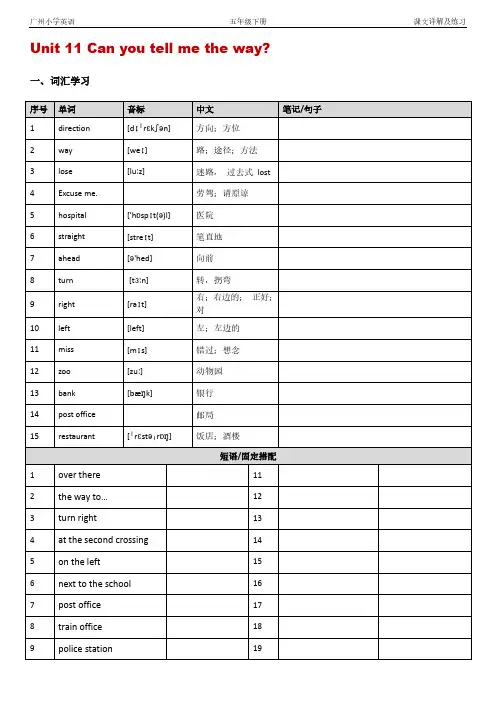
Unit 11 Can you tell me the way?一、词汇学习二、课文学习Can you tell me the way?Janet: Oh dear! I think we’re lost.Ben: Let’s go and ask the lady over there.Janet: Excuse me. Can you tell me the way to the hospital, please?Lady: Of course. Let me see. Go straight ahead then turn right at the second crossing.Ben: Is the hospital on the left or on the right?Lady: It’s the building on your right, opposite the school. You can’t miss it.Janet and Ben: Thank you so much.【考点一】固定搭配✧the way to + 地方_________________✧go straight ahead _________________✧turn right _________________✧turn left _________________✧at the second crossing _________________✧on the right _________________✧on the left _________________✧opposite the school _________________✧miss it_________________【考点二】地点名词factory post officeshop libraryrestaurant hotelcinema police stationmuseum marketpark banktrain station schoolhospital Children’s Palace[组题练习]去图书馆的路_________________向前走_________________在第一个路口_________________在第一个路口左转_________________在图书馆对面_________________错过它_________________Unit 12 I know a short cut 一、词汇学习二、课文学习I know a short cutJohn and Joan were standing in front of their house and John looked at his watch.“We’ll be late. The film starts in ten minutes, but we need 15 minutes to getthere,” John said to Joan and he started to walk quickly.“Don’t worry. We have time,” Joan said, “I know a short cut.”To get to the cinema, John usually turns left out of their house. Then he takes thefirst right, goes straight ahead and takes the second left. But today Joan took him adifferent way. They crossed the main street and turned left into the park. Theywalked through the park and out of the front gate.Suddenly they were in front of the cinema. John looked at his watch. “I can’t believeit. We are on time. You’re really great, Joan!”【考点一】watch①看:watch TV, watch a football match②手表:look at his watch【考点二】固定搭配①look at his watch_______________②walk quickly_______________③don’t worry_______________④short cut_______________⑤get to_______________⑥out of their house_______________⑦take the first right_______________⑧go straight ahead_______________⑨take the second left_______________⑩ a different way_______________⑪cross the main street_______________⑫walk through the park_______________⑬in front of the cinema_______________⑭on time_______________【考点三】in + 时间段_______________①in ten minutes_______________②in four hours_______________③in a week_______________【考点四】get to_______________①到达学校_______________②到达电影院_______________③到达广州_______________④到家_______________⑤到哪里_______________【考点五】need 的用法①need + 名词②need to do【考点六】start的用法①start to do = start doing ___________________【考点七】动词过去式:把课文中的动词过去式归类①+ed :_______________________________________________________________________②不规则变化:_______________________________________________________________________【More Practice】Go straight ahead and then turn right at the first crossing.The building is on the left.【口语练习】问路A: Excuse me. Can you tell me the way to _________?B: Yes. ______________________________________________________________________________.模块单元练习M6 : U11~12。
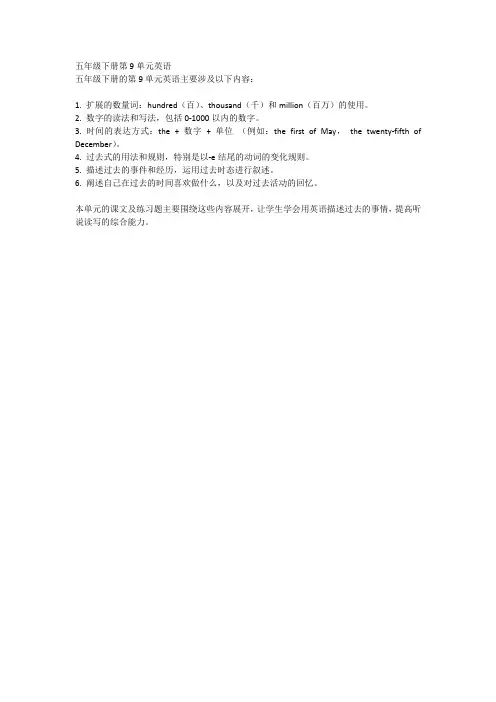
五年级下册第9单元英语
五年级下册的第9单元英语主要涉及以下内容:
1. 扩展的数量词:hundred(百)、thousand(千)和million(百万)的使用。
2. 数字的读法和写法,包括0-1000以内的数字。
3. 时间的表达方式:the + 数字+ 单位(例如:the first of May,the twenty-fifth of December)。
4. 过去式的用法和规则,特别是以-e结尾的动词的变化规则。
5. 描述过去的事件和经历,运用过去时态进行叙述。
6. 阐述自己在过去的时间喜欢做什么,以及对过去活动的回忆。
本单元的课文及练习题主要围绕这些内容展开,让学生学会用英语描述过去的事情,提高听说读写的综合能力。
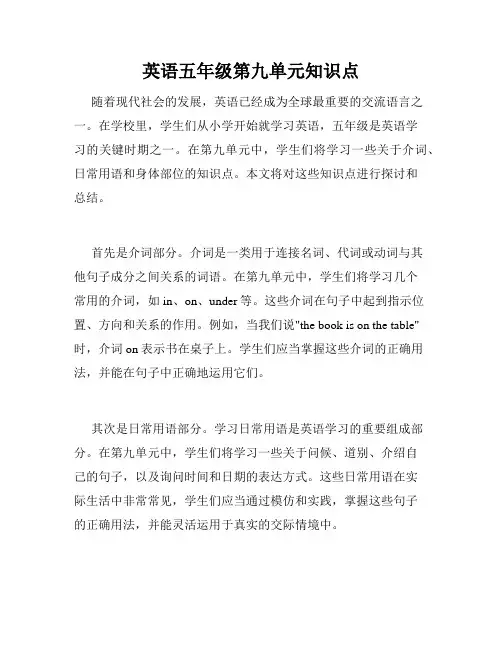
英语五年级第九单元知识点随着现代社会的发展,英语已经成为全球最重要的交流语言之一。
在学校里,学生们从小学开始就学习英语,五年级是英语学习的关键时期之一。
在第九单元中,学生们将学习一些关于介词、日常用语和身体部位的知识点。
本文将对这些知识点进行探讨和总结。
首先是介词部分。
介词是一类用于连接名词、代词或动词与其他句子成分之间关系的词语。
在第九单元中,学生们将学习几个常用的介词,如in、on、under等。
这些介词在句子中起到指示位置、方向和关系的作用。
例如,当我们说"the book is on the table"时,介词on表示书在桌子上。
学生们应当掌握这些介词的正确用法,并能在句子中正确地运用它们。
其次是日常用语部分。
学习日常用语是英语学习的重要组成部分。
在第九单元中,学生们将学习一些关于问候、道别、介绍自己的句子,以及询问时间和日期的表达方式。
这些日常用语在实际生活中非常常见,学生们应当通过模仿和实践,掌握这些句子的正确用法,并能灵活运用于真实的交际情境中。
最后是身体部位部分。
了解和掌握身体部位的英文词汇对于学生们的语言表达能力是非常重要的。
在第九单元中,学生将学习一些身体部位的名称,如head、shoulder、knee等。
掌握这些单词的拼写和发音,并能正确运用它们进行描述和表达是学生们的学习目标。
通过练习和积累,学生们可以逐渐提升自己的英语词汇量。
除了以上提到的知识点外,第九单元还包括一些与上述内容相关的语法和练习题。
通过这些练习题,学生们可以检验自己对所学知识的掌握程度,并进一步加强理解和运用能力。
例如,可以设计一些与介词相关的填空和翻译题,或者让学生们进行口头表达,描述自己的身体部位。
在教学过程中,教师应当采用多种教学方法和手段来帮助学生理解和掌握这些知识点。
可以通过图片、视频、游戏等多媒体教学工具来呈现内容,激发学生的学习兴趣和积极性。
同时,教师还应当积极引导学生进行口头和书面表达,培养他们的语言运用能力。
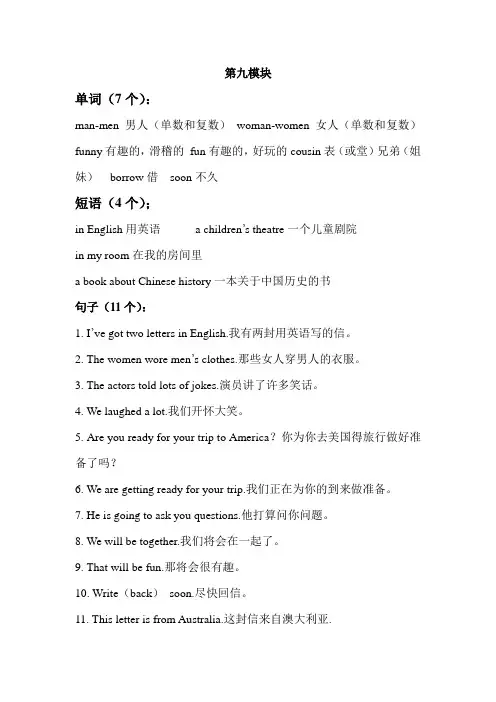
第九模块
单词(7个):
man-men男人(单数和复数)woman-women女人(单数和复数)funny有趣的,滑稽的fun有趣的,好玩的cousin表(或堂)兄弟(姐妹)borrow借soon不久
短语(4个);
in English用英语 a children’s theatre一个儿童剧院
in my room在我的房间里
a book about Chinese history一本关于中国历史的书
句子(11个):
1. I’ve got two letters in English.我有两封用英语写的信。
2. The women wore men’s clothes.那些女人穿男人的衣服。
3. The actors told lots of jokes.演员讲了许多笑话。
4. We laughed a lot.我们开怀大笑。
5. Are you ready for your trip to America?你为你去美国得旅行做好准备了吗?
6. We are getting ready for your trip.我们正在为你的到来做准备。
7. He is going to ask you questions.他打算问你问题。
8. We will be together.我们将会在一起了。
9. That will be fun.那将会很有趣。
10. Write(back)soon.尽快回信。
11. This letter is from Australia.这封信来自澳大利亚.。
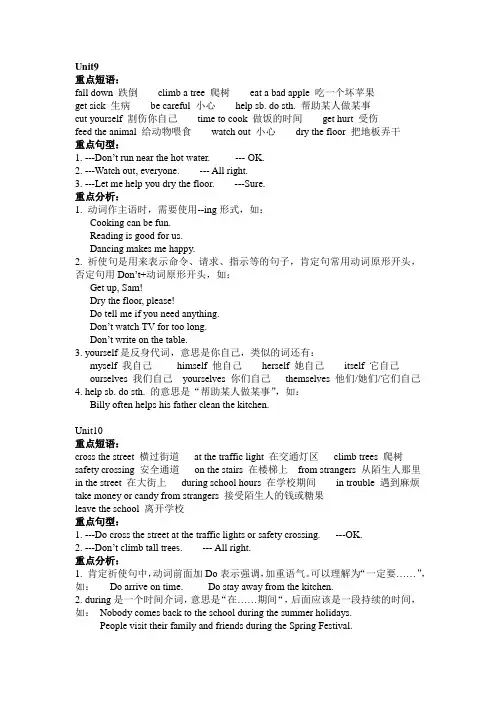
Unit9重点短语:fall down 跌倒climb a tree 爬树eat a bad apple 吃一个坏苹果get sick 生病be careful 小心help sb. do sth. 帮助某人做某事cut yourself 割伤你自己time to cook 做饭的时间get hurt 受伤feed the animal 给动物喂食watch out 小心dry the floor 把地板弄干重点句型:1. ---Don’t run near the hot water. --- OK.2. ---Watch out, everyone. --- All right.3. ---Let me help you dry the floor. ---Sure.重点分析:1. 动词作主语时,需要使用--ing形式,如:Cooking can be fun.Reading is good for us.Dancing makes me happy.2. 祈使句是用来表示命令、请求、指示等的句子,肯定句常用动词原形开头,否定句用Don’t+动词原形开头,如:Get up, Sam!Dry the floor, please!Do tell me if you need anything.Don’t watch TV for too long.Don’t write on the table.3. yourself是反身代词,意思是你自己,类似的词还有:myself 我自己himself 他自己herself 她自己itself 它自己ourselves 我们自己yourselves 你们自己themselves 他们/她们/它们自己4. help sb. do sth. 的意思是“帮助某人做某事”,如:Billy often helps his father clean the kitchen.Unit10重点短语:cross the street 横过街道at the traffic light 在交通灯区climb trees 爬树safety crossing 安全通道on the stairs 在楼梯上from strangers 从陌生人那里in the street 在大街上during school hours 在学校期间in trouble 遇到麻烦take money or candy from strangers 接受陌生人的钱或糖果leave the school 离开学校重点句型:1. ---Do cross the street at the traffic lights or safety crossing. ---OK.2. ---Don’t climb tall trees. --- All right.重点分析:1. 肯定祈使句中,动词前面加Do表示强调,加重语气。
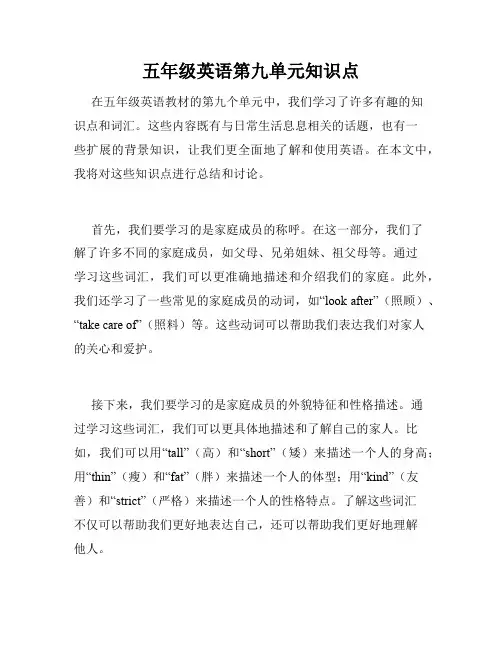
五年级英语第九单元知识点在五年级英语教材的第九个单元中,我们学习了许多有趣的知识点和词汇。
这些内容既有与日常生活息息相关的话题,也有一些扩展的背景知识,让我们更全面地了解和使用英语。
在本文中,我将对这些知识点进行总结和讨论。
首先,我们要学习的是家庭成员的称呼。
在这一部分,我们了解了许多不同的家庭成员,如父母、兄弟姐妹、祖父母等。
通过学习这些词汇,我们可以更准确地描述和介绍我们的家庭。
此外,我们还学习了一些常见的家庭成员的动词,如“look after”(照顾)、“take care of”(照料)等。
这些动词可以帮助我们表达我们对家人的关心和爱护。
接下来,我们要学习的是家庭成员的外貌特征和性格描述。
通过学习这些词汇,我们可以更具体地描述和了解自己的家人。
比如,我们可以用“tall”(高)和“short”(矮)来描述一个人的身高;用“thin”(瘦)和“fat”(胖)来描述一个人的体型;用“kind”(友善)和“strict”(严格)来描述一个人的性格特点。
了解这些词汇不仅可以帮助我们更好地表达自己,还可以帮助我们更好地理解他人。
在这个单元中,我们还学习了如何对家人进行询问和回答关于他们的问题。
通过这些句型和对话,我们可以更好地与他人交流和沟通。
比如,当我们想询问某人的兄弟姐妹时,我们可以问:“Do you have any brothers or sisters?”(你有兄弟姐妹吗?)然后,我们可以用“Yes, I have a brother.”(是的,我有一个弟弟。
)或“No, I don't have any sisters.”(不,我没有姐妹。
)来回答这个问题。
此外,在这个单元中,我们还学习了一些关于家庭的其他词汇和表达。
比如,我们学习了如何询问和回答“Whose...is this?”(这是谁的……?)这个问题可以用来询问和确认某个物品的所有者。
我们还学习了一些表示时间和时间段的词汇,如“morning”(早上)、“afternoon”(下午)和“evening”(晚上)。
五年级下册英语第9课学习指南一、课程介绍本课是五年级下册英语的第九课,主题是“描述人物特点”。
本课将通过一系列的听、说、读、写活动,帮助学生掌握如何用英语描述一个人的外貌、性格和爱好等特点。
在学习过程中,学生将通过真实场景的模拟和互动,提高他们的英语交际能力和思维品质。
二、词汇学习本课将学习以下新单词:tall 高的short 矮的thin 瘦的fat 胖的quiet 安静的outgoing 外向的hobbies 爱好sports 运动reading 阅读cooking 烹饪三、语法重点本课的语法重点是形容词的用法。
学生将学习如何使用形容词来描述一个人的外貌和性格特点。
此外,他们还将学习一些常见的形容词比较级形式,如“taller”、“shorter”、“thinner”、“fatter”等。
四、课文理解本课的课文是一篇关于一个名叫Jenny的女孩的描述。
文中描述了Jenny的外貌特点(tall and thin)和性格特点(quiet and hard-working),同时还提到了她的两个爱好——reading和cooking。
在学习课文的过程中,学生需要理解并掌握描述人物特点的方法和技巧。
五、听力训练本课的听力材料是一段对话,对话中两个人分别描述了他们的一个朋友的外貌和性格特点。
学生在听完对话后,需要完成一些填空和选择题,以检验他们对新学词汇和语法的掌握情况。
此外,学生还可以通过多听类似的对话来提高他们的英语听力水平和语言感知能力。
六、口语练习本课的口语练习是让学生模仿课文中的描述方式,用自己的语言来描述一个身边的人。
学生可以描述自己的家人、朋友或者同学等。
在描述时,他们需要尽可能地使用本课所学的形容词来描述这个人的外貌、性格和爱好等特点。
通过这样的练习,学生可以提高他们的英语口语表达能力和思维组织能力。
Unit 9 Be careful!词汇学习课文学习Mrs Webb:Come on, kids. It’s time to cook the noodles.Ben: Oops!Mrs Webb: Be careful, Ben. Don’t run near the hot water. You’ll get hurt.Mrs Webb: Cooking can be fun, but you must be careful.Ben: Yes. You’re right.Xiaoling:Don’t cut the vegetables so quickly, Ben. The knife is sharp. You may cut yourself.Mrs Webb:Watch out, everyone. The floor is very wet. Don’t walk there. You may fall down.Ben: Here...Let me help you dry the floor.Mrs Webb:Great work, Ben. Safety first. Don’t forget.【考点一】It’s time for/to …. 是时候做某事▪It’s time for + 名词▪It’s time to + 动词【考点二】动词在句子开头,需要使用-ing形式或者使用动词原形▪动词在句子开头,需要使用-ing形式–动名词Cooking can be fun.Dancing makes me happy.▪动词在句子开头,需要使用动词原形–祈使句Watch out, everyone.Be careful, Ben.Don’t run near the hot water.Don’t cut the vegetables so quickly.[巩固练习]_________ (cook) is not interesting._________ (study) hard, please.Don’t _________ (cook) in the bedroom.Don’t _________ (play) in the street, children.【考点三】safe & safety▪safe 安全的(形容词)▪safety 安全(名词)【考点四】情态代词+ 动词原形▪must/can/may/should/will + 动词原形【考点五】help的固定搭配▪help sb. do sth▪help … with + 名词【考点六】反身代词▪主格宾格形容词性物主代词反身代词▪I me my myself▪you you your yourself▪he him his himself▪she her her ___________▪it it its ___________▪we us our ___________▪you you your ___________▪they them their ___________________________________________________________________________________________________________ ________________________________________________________________________________________________ ________________________________________________________________________________________________ ________________________________________________________________________________________________ ________________________________________________________________________________________________【同步练习1】【同步练习2】1. 根据句意写单词或用所给单词的适当形式填空。
教师辅导讲义教学内容Do one at a time, and do well!一次只做一件事,做到最好!1.在放学后都做些什么呢?2.平时这个时间都做些什么呢?3.在周末你做些什么呢?那么,妈妈做些什么呢?【新授课知识讲解】一、重点词汇讲解1. go for a picnic 去野餐= have a picnicExample: Let’s go for a picnic tomorrow.我们明天去野餐吧。
2. go shopping 买东西,去购物Example: Would you like to go shopping with me?你愿意和我一起去买东西吗?在句子中,shop可以作名词,表示商店;还可以作动词,表示购物。
shop→shopping你还能想起来其它类似的动词-ing的形式吗?请写下来三个:__________;________;_________.【想一想】去滚轴溜冰______________________; 去滑冰______________________.3. play in the school band 参加校乐队Example: My desk-mate and I want to play in the school band.我和同桌都参加了校乐队。
play原意是玩儿,在这里是固定用法,表示参加;表示参加的词还有attend, join, take part in等等.4. play the flute 吹笛子Example: I’m good at playing the flute.我擅长吹笛子。
【小拓展想一想】音乐类:弹钢琴______________; 拉小提琴_____________; 敲鼓_____________;运动类:打篮球______________; 踢足球_______________; 打羽毛球______________; 打网球_______________;发现什么区别了吗?请记录下来:_________________________________________________________________________________________________.5. do the dishes 洗碗= wash the dishesExample: I often do the dishes after supper.在家里,我还帮妈妈做这些家务:洗衣服_______________; 铺床_______________; 扫地_____________.6. make a model plane 制作航模Example: Can you make a model plane?你会制作航模吗?【想一想】做风筝______________; 做轮船模型___________;飞机还可以这样说_____________.7. learn to act 学表演Example: She is learning to act in the drama club.【课外拓展想一想】演员________; 女演员________; 导演director; 编剧scriptwriter.8.kick a shuttlecock 踢毽子Example: I like to kick a shuttlecock on gym class.【想一想】跳绳__________;9. go to the drama club 参加戏剧社club 俱乐部英语俱乐部____________.10.once 一次twice 两次副词,表示频率【想一想】频率词:三次__________________; 十次_______________.基数词:1______; 2______; 3_______.序数词:第一___________; 第二___________; 第三___________.11.never 从未【想一想】通常__________; 经常_________; 总是__________; 有时__________.休息一下小谜语猜猜猜吧1.Which letter(字母) can drink?2.Which letter is blue?3.Which letter is a kind of animal?4.Which letter can see you?5.Which letter can park a car(停车)?6.Which letter has many question?7.Which two letters that everyone likes to listen to?8.Which three letters that the thief(小偷) fears to hear?9.How many letters in English?10.Which letter is the end of the world(世界)?【典型例题】一、短语练习()1、吹笛子A、kick the shuttlecock()2、买东西B、do the dishes()3、学表演C、play badminton()4、去野餐D、learn to act()5、洗碗E、go shopping()6、制作航模F、go to the drama club()7、参加校乐队G、go for a picnic()8、打羽毛球H、make a model plane()9、去滚轴溜冰I、go roller-skating()10、参加戏剧社J、play the flute()11、踢毽子K、play in the school band二、完成下面单词,选出正确的序号()1、nev A、or B、er C、ir ()2、on e A、a B、c C、i ()3、tw A、ice B、ece C、oce ()4、ften A、e B、o C、a()5、v ryday A、e,e B、i,i C、e,o()6、p cn c A、i,e B、i,o C、i,i()7、fl te A、a B、o C、u()8、shuttlec ck A、i B、o C、a三、选出不同类的单词()1、A、go roller-skating B、go swimming C、read books()2、A、twice B、three times C、never()3、A、do the dishes B、play the flute C、drama club()4、A、weekend B、make a model plane C、play in the school band()5、A、go for a picnic B、a shuttlecock C、learn to act二、重点句型讲解1)询问日常活动1. 询问对方日常活动的句型及答语:What do you do + 其他?I / We often + 动词原形+ 其他Example: A: What do you do after school? 你放学后做什么?B: I often go to the drama club. 我经常参加戏剧社。
广州新版英语五年级下Unit12Iknowashortcut编辑整理:尊敬的读者朋友们:这里是精品文档编辑中心,本文档内容是由我和我的同事精心编辑整理后发布的,发布之前我们对文中内容进行仔细校对,但是难免会有疏漏的地方,但是任然希望(广州新版英语五年级下Unit12Iknowashortcut)的内容能够给您的工作和学习带来便利。
同时也真诚的希望收到您的建议和反馈,这将是我们进步的源泉,前进的动力。
本文可编辑可修改,如果觉得对您有帮助请收藏以便随时查阅,最后祝您生活愉快业绩进步,以下为广州新版英语五年级下Unit12Iknowashortcut的全部内容。
Unit 12 I know a short cut一、单词回顾:站,立______ 手表_______ 迟的______ 需要________ 外面______通过_______ 突然______ 相信______ 捷径______ 及时,按时______在……的外面_______ take的过去式______ 在第一个路口右转_________二、重点短语:in front of 在…。
前面 in ten minute 在十分钟内 get there 到达那里Don’t worry。
别担心. short cut 近路 take the first right 在第一个路口向右转turn left out of the house 出家门向右转 walk through the park 穿过公园turn left 向左转 a different way 一条不同的路 the main street 大街主干道start to walk quickly 开始赶快走 turn left into the park 左转进入公园walk out of the front gate 从前门走出 on time 准时三、重点句型:1。
John and Joan were standing in front of their house and john looked at his watch.2。
教科广州版五下英语UNIT12知识清单一、重点句型:1. John and Joan were standing in front of their house and John looked at his watch.2. John said to Joan and he started to walk quickly.3. To get to the cinema, John usually turns left out of their house. Then he takes the first right, goes straight ahead and takes the second left.二、重点分析:1.描述线路的用语:Turn right / left out of…Take the second right.Take a different way.Cross the main street.Turn left / right into the…Walk through…Walk out of the front gate.2. in ten minutes在十分钟内in + 时间段,表示“在某段时间内”,如:We will get there in half an hour.She finished the book in three months.3. get there意思是“到达那里”,如果是到达一个具体的地方,要用get to…但是到家是get home如:When can we get home?I usually get to the school at 7:25.4. take sb. to…把某人带……,如:My friend will take me to the Great Wall.5. need,表示需要1.need+名词, 需要...he needs some help.他需要帮助2.need to do , 需要做...I need to make a phone call.我需要打个电话3.There is no need to do sth,没有必要...There is no need to call a doctor.没有必要叫医生6.on time / in timeon time 准时/按时,一般放在句末表示按照约定的时间,既不早到,也不晚到,The 11:30 a.m. train left on time.上午11:30的火车按时出发了(就是11:30出发的)对应的反义词是late,迟的Be on time. Don't be late.要准时,不要迟到in time 及时,后面还须跟动词或者某种情况Will you be home in time for dinner?你能赶得及回家吃晚饭吗?I like to get up ealy in time to have a big breakfast before going to work.我喜欢早起,好来得及在上班之前吃一顿丰盛的早餐。
Unit9重点短语:fall down 跌倒climb a tree 爬树eat a bad apple 吃一个坏苹果get sick 生病be careful 小心help sb. do sth. 帮助某人做某事cut yourself 割伤你自己time to cook 做饭的时间get hurt 受伤feed the animal 给动物喂食watch out 小心dry the floor 把地板弄干重点句型:1. ---Don’t run near the hot water. --- OK.2. ---Watch out, everyone. --- All right.3. ---Let me help you dry the floor. ---Sure.重点分析:1. 动词作主语时,需要使用--ing形式,如:Cooking can be fun.Reading is good for us.Dancing makes me happy.2. 祈使句是用来表示命令、请求、指示等的句子,肯定句常用动词原形开头,否定句用Don’t+动词原形开头,如:Get up, Sam!Dry the floor, please!Do tell me if you need anything.Don’t watch TV for too long.Don’t write on the table.3. yourself是反身代词,意思是你自己,类似的词还有:myself 我自己himself 他自己herself 她自己itself 它自己ourselves 我们自己yourselves 你们自己themselves 他们/她们/它们自己4. help sb. do sth. 的意思是“帮助某人做某事”,如:Billy often helps his father clean the kitchen.Unit10重点短语:cross the street 横过街道at the traffic light 在交通灯区climb trees 爬树safety crossing 安全通道on the stairs 在楼梯上from strangers 从陌生人那里in the street 在大街上during school hours 在学校期间in trouble 遇到麻烦take money or candy from strangers 接受陌生人的钱或糖果leave the school 离开学校重点句型:1. ---Do cross the street at the traffic lights or safety crossing. ---OK.2. ---Don’t climb tall trees. --- All right.重点分析:1. 肯定祈使句中,动词前面加Do表示强调,加重语气。
可以理解为“一定要……”,如:Do arrive on time. Do stay away from the kitchen.2. during是一个时间介词,意思是“在……期间“,后面应该是一段持续的时间,如:Nobody comes back to the school during the summer holidays.People visit their family and friends during the Spring Festival.Unit11重点短语:over there 在那边the way to 去…..的路turn right 向右转on the left 在左边of course 当然at the second crossing 在第二个十字路口be lost 迷路let me see 让我想想next to the school 在学校隔壁go straight ahead 向前直走the third building on the right 右手边的第三栋建筑重点句型:1. ---Can you tell me the way the hospital, please?---Go straight ahead then turn right at the second crossing.2. ---Is the hospital on the left or on the right?---It is on the right.3. ---Thank you so much. --- You’re welcome.重点分析:1. 问路用语:We are lost.Excuse me.Can you tell me the way to…, please?Can you tell me how to go to…, please?Is it on the left or on the right?2. 指路用语:Let me see.Go straight ahead.Turn right at the second crossing. = Take me the second right.The hospital is the third building on the left.It’s next to be…You can’t miss it.Unit12重点短语:in front of 在…..前面in ten minute 在十分钟内get there 到达那里Don’t worry. 别担心。
short cut 近路take the first right 在第一个路口向右转turn left out of the house 出家门向右转walk through the park 穿过公园turn left 向左转 a different way 一条不同的路the main street 大街主干道start to walk quickly 开始赶快走turn left into the park 左转进入公园walk out of the front gate 从前门走出on time 准时重点句型:1. John and Joan were standing in front of their house and john looked at his watch.2. John said to Joan and he started to walk quickly.3. To get to the cinema, John usually turns left out of their house. Then he takes the first right, goes straight ahead and takes the second left.重点分析:1.描述线路的用语:Turn right / left out of…Take the second right.Take a different way.Cross a main street.Turn left / right into the…Walk thought…Walk out of the front gate.2. in ten minutes在十分钟内。
in + 时间段,表示“在某段时间内”,如:We will get there in half an hour.She finished the book in three months.3. get there意思是“到达那里”,如果是到达一个具体的地方,要用get to…。
但是到家是get home。
如:When can we get home?I usually get to the school at 7:25.4. take sb. to…把某人带……,如:My friend will take me to the Great Wall.单词默写Unit 1 What’s your favourite season?多彩的___________________________ 选择,宁愿要_____________________冬天_____________________________ 种植,植物_______________________去野营___________________________ 野营,营地_______________________也_______________________________ 秋天_____________________________滑雪_____________________________Unit 2 It’s the middle of winter.中间的,中等的___________________ 回答_____________________________同班同学_________________________ 中国_____________________________如果_____________________________ 太......以致于......_________________澳大利亚________________________Unit 3 We are going to have an English test.考试_____________________________ 日期_____________________________打算;将_________________________ 忘记_____________________________重要的___________________________ 月_______________________________博物馆___________________________ 会议_____________________________开放日___________________________ 农场_____________________________ 第三_____________________________ 第五_____________________________第八_____________________________ 第九_____________________________Unit4 Have a good time in Hainan.旅行_____________________________ 大山_____________________________爬山_____________________________ 海滨_____________________________鹿(复数)_______________________ 爬_________________________________过得愉快___________________________Unit 5 Would you like to go with us?邀请_______________________________ 计划_______________________________ 嗨_________________________________ 小伙子,家伙_______________________ 没有东西,没有事情_________________ 为什么_____________________________ 听起来_____________________________ 将会,将,愿意_____________________ 你愿意......吗?_____________________ 大门_______________________________ 酷,太妙了_________________________ 天啊_______________________________ 问题_______________________________ 电影_______________________________ 比赛_______________________________ 中心_______________________________ 超市_______________________________Unit 6 See you at the party.我想(做)_________________________ 邀请_______________________________ 特别的_____________________________ 惊奇,使惊奇_______________________ (使)激动的_______________________ 开始_______________________________ 下午_______________________________ 到达_______________________________ 叫,打电话_________________________Unit 7 We Will go by train.岛_________________________________ 火车_______________________________ 乘,由_____________________________ 激动的,兴奋地_____________________ 山谷_______________________________ 出租汽车___________________________ 离开_______________________________Unit 8 Ben’s first trip to Beijing.旅店______________________________ 旅行,远足________________________步行______________________________ 长城______________________________宫殿______________________________ 颐和园____________________________ 散步______________________________ 围绕着,在......的周围______________湖________________________________ 大街,马路________________________ 地铁______________________________Unit 9 Be careful.伤害______________________________ 小心的____________________________来吧,快点,赶快__________________ 小孩子____________________________哎呀______________________________ 必须______________________________ 锐利的,尖利的____________________ 割________________________________你自己____________________________注意_______________________落;倒___________________________ 向下_____________________________跌倒_____________________________ 坏的_____________________________扇,风扇_________________________ 喂(食);喂养____________________危险的___________________________Unit10 How to stay safe?安全_____________________________ 安全的___________________________横过_____________________________ 交通_____________________________灯_______________________________ 人行横道,十字路口_______________楼梯_____________________________ 钱_______________________________糖果_____________________________ 陌生人___________________________麻烦,烦恼_______________________ 遇到麻烦_________________________没有_____________________________Unit 11 Can you tell me the way?医院_____________________________ 方向,方位_______________________路,途径,方法___________________ 迷路_____________________________劳驾,请原谅_____________________ 笔直的___________________________右,右边的,正好,对_____________ 左,左边的_______________________向前_____________________________ 错过,想念_______________________银行_____________________________ 邮局_____________________________火车站___________________________ 动物园___________________________警察局___________________________ 饭店,酒楼_______________________Unit 12 I know a short cut.及时,按时_______________________ 捷径_____________________________是(are的过去式)_______________ 站,立______________________________手表_____________________________ 迟的_____________________________需要_________________________ 外面_____________________________在......的外面_____________________________ 走(路线),take过去式__________________ 在第一个路口右转________________________。